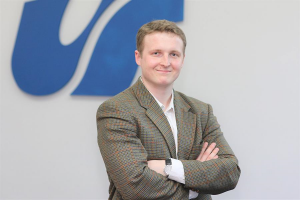Paweł Szala, a graduate of the Faculty of Law and Administration, attorney trainee, laureate of numerous competitions in the field of law.
Studying two fields, combining theory with legal practice, and participating in legal knowledge competitions ‒ this is the summary of the period of study of Paweł Szala, a graduate of the University of Silesia. Especially the last of these activities gave him a lot of joy. He is a laureate of several competitions organized by the so-called companies of the big four: Deloitte, Ernst & Young (EY), KPMG and PricewaterhouseCoopers (PwC). In May 2019, he took second place in the KPMG nationwide competition on taxation – Tax’n’You.
If I were to advise someone who is just thinking about taking up law studies, I would certainly emphasize the importance of combining theory and practice. In my opinion, studying law was quite abstract without practical knowledge. We can feel what we are really studying only when we implement specific provisions and see how they decide about the course of things that happen to people all over the world.
Already while studying at the University of Silesia, I practiced in one of the law firms, in which, after graduation, I started working. Thanks to this cooperation, I was able to have real contact with legal documents and norms that I learned about at the university, and began to recognize and apply them in practice. The law teaches you how to understand great and important things, which Cicero wrote about, among others, but also quite prosaic, related to, for example, the situation when a seller does not want to accept the complaint about the hairdryer we just bought.
Studies at the University of Silesia are organized in such a way so that students can easily find time for this kind of internship. I am the best example. Not only did I combine study and work, but I also studied philosophy for over two years.
I chose the law because of my wide interest in humanities and good career prospects. During my studies I met many interesting people both among the academic teachers and other students. For example, the decision to start a second field of study was made with my friend Krzysztof Dąbrówka. Together we came to a conclusion that the philosophical themes appearing in law classes are so interesting that it is worth exploring them more intensively than we have done it so far. It was something that stimulated us intellectually. I was most interested in the periods of antiquity and the Middle Ages, but I am particularly grateful to the late Professor Katarzyna Niebrój and Professor Bogdan Dembinski for showing me a different picture of studies – vivid, full of depth, not escaping from difficult and controversial subjects.
At the Faculty of Social Sciences, I was pleased to take part in various discussions that allowed me to discuss many less important themes but also related to questions that each of us could ask. At the Faculty of Law, by contrast, we mainly studied dogmas with a certain well-defined, indisputable shape. Of course, it is possible to interpret the law, but it seems that it is reserved for practice rather than theory. During the classes, there is hardly any room for discussing the interpretation of individual provisions. We must get to know them first.
At this point, an anecdote comes to my mind, told by Professor Sławomir Tkacz during my first year of studies. He shared with us the absolute basics of law which for us were “little discoveries of America”. He compared the skill of legal argumentation to tools and cars. Defects in old cars can be dealt with by using a hammer, and all such codes and legal acts that we face throughout most of our studies are such a hammer. Newer cars require not only a hammer, but also a full toolbox and specialized software. It is customs, traditions, but also philosophy, psychology, history, economics or ethics, all of which are closely related to the law. The Professor announced that he would come back to us at the end of our studies and then he would prove the superiority of the toolbox over the hammers we were equipped with during our five years of studies. And this is what happened. Paradoxically, I consider the subject of the theory and philosophy of law conducted by the Professor to be the most practical class I have participated in during my five years of studies.
Studies at the University of Silesia have been intellectually the most prolific period of my life so far and I am grateful to everyone who contributed to it.
Photography: Małgorzata Kłoskowicz






